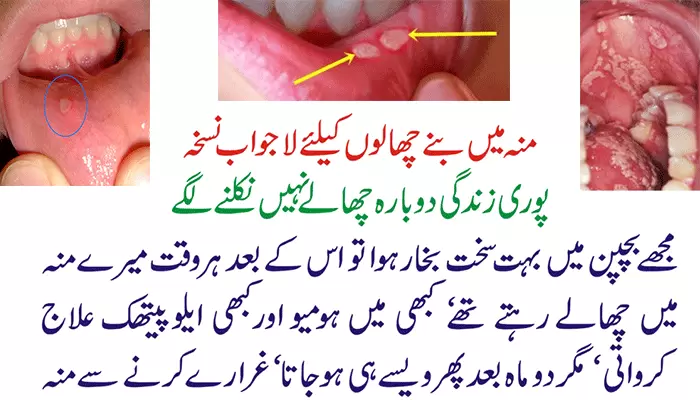
Canker sores are small, painful ulcers that appear inside the mouth, on the tongue, or the gums. They can make eating, drinking, and talking uncomfortable. Canker sores are not contagious and usually heal on their own within one or two weeks. However, some home remedies can help speed up the healing process and reduce the pain and inflammation.
Not Contagious: Unlike cold sores, which are caused by the herpes simplex virus and are contagious, canker sores are not caused by a virus and are not contagious. They are often related to other factors like injury or stress.
Canker Sores Treatment (Urdu)

Different from Cold Sores: Canker sores are often confused with cold sores, but they are different. Cold sores are caused by a virus and typically occur on or around the lips, whereas canker sores are found inside the mouth.
Healing Time: In most cases, canker sores heal on their own within one to two weeks. However, the pain and discomfort during this period can be managed with home remedies.

What Causes Canker Sores?
The exact cause of canker sores is not known, but some factors may trigger or worsen them, such as:
- – Injury to the mouth, such as biting your cheek, brushing too hard, or wearing braces or dentures that don’t fit well
– Stress or anxiety - – Hormonal changes, especially during menstruation
- – Food allergies or sensitivities, especially to acidic or spicy foods
- – Vitamin or mineral deficiencies, such as iron, zinc, folic acid, or vitamin B12
- – Certain medications, such as chemotherapy drugs or NSAIDs
- – Certain medical conditions, such as celiac disease, inflammatory bowel disease, or immune system disorders
Home Remedies for Canker Sores
Many home remedies can help treat canker sores at home. Some of them are:
– Salt water rinse:
Saltwater can help dry out the canker sore and reduce inflammation. Dissolve one teaspoon of salt in half a cup of warm water and swish it in your mouth for 15 to 30 seconds. Repeat this several times a day until the sore heals.
– Baking soda rinse:
Baking soda can help neutralize the acidity in the mouth and soothe the pain. Mix one teaspoon of baking soda with half a cup of warm water and rinse your mouth with it. Do this three or four times a day until the sore goes away.
– Hydrogen peroxide rinse:
Hydrogen peroxide can help disinfect the canker sore and prevent infection. Dilute one part of 3% hydrogen peroxide with two parts of water and swish it in your mouth for a few seconds. Spit it out and rinse your mouth with plain water. Do this once or twice a day until the sore heals.
– Aloe vera gel:
Aloe vera has anti-inflammatory and healing properties that can help heal canker sores. Apply some fresh aloe vera gel directly to the sore with a cotton swab. Leave it on for a few minutes and then rinse your mouth with water. Repeat this three or four times a day until the sore disappears.
– Honey:
Honey has antibacterial and anti-inflammatory properties that can help heal canker sores. Dab some raw honey on the sore with a cotton swab. Leave it on for 10 to 15 minutes and then rinse your mouth with water. Do this two or three times a day until the sore heals.
– Chamomile tea bag:
Chamomile has soothing and anti-inflammatory properties that can help reduce pain and swelling. Place a wet chamomile tea bag on the sore for 10 to 15 minutes. Do this two or three times a day until the sore goes away.
– Alum powder:
Alum is a natural astringent that can help shrink and dry out canker sores. Make a paste by mixing a small amount of alum powder with a drop of water. Apply it to the sore with a cotton swab and leave it on for one minute. Rinse your mouth thoroughly with water. Repeat this once a day until the sore heals.
Canker sores are common and usually harmless ulcers in the mouth that can cause discomfort and irritation. They can be treated with some home remedies that can help speed up the healing process and reduce the pain and inflammation. However, if your canker sores are severe, persistent, or recurrent, you should see a doctor or dentist for proper diagnosis and treatment.
FAQs about Canker Sores:
1. Q: Can I prevent canker sores from occurring in the first place?
A: While it’s challenging to completely prevent canker sores, you can reduce the risk by avoiding triggers. Be mindful of oral injuries, manage stress through relaxation techniques, maintain good oral hygiene, and identify and manage food allergies or sensitivities.
2. Q: Are over-the-counter (OTC) medications effective for treating canker sores?
A: Over-the-counter topical treatments, such as creams or gels containing benzocaine or numbing agents, can provide relief from pain. Additionally, antimicrobial mouthwashes or oral gels may help prevent infection. However, consult with a healthcare professional before using any medication.
3. Q: Can certain foods exacerbate canker sores?
A: Yes, certain foods, particularly acidic or spicy ones, may irritate canker sores and prolong the healing process. Avoiding these foods during an outbreak can help manage discomfort.
4. Q: Is there a link between canker sores and systemic health issues?
A: Generally, canker sores are localized and not linked to serious systemic health problems. However, recurrent or severe cases may indicate an underlying health issue. If you experience persistent or unusual symptoms, consult with a healthcare professional for a thorough evaluation.
5. Q: Can vitamin supplements help prevent canker sores?
A: Maintaining a balanced diet rich in vitamins and minerals is essential for oral health. While vitamin supplements may help address deficiencies, it’s crucial to consult with a healthcare provider to determine the appropriate dosage and ensure overall health.
6. Q: Can smoking or tobacco use contribute to the development of canker sores?
A: Yes, smoking and tobacco use can irritate the mouth’s delicate tissues, making it more susceptible to canker sores. Quitting smoking or using tobacco products may contribute to overall oral health.
7. Q: When should I seek professional medical advice for canker sores?
A: If your canker sores persist for more than two weeks, are unusually large, cause severe pain, or experience additional symptoms such as fever, it’s advisable to consult a healthcare professional for a comprehensive evaluation. Persistent or recurrent canker sores may indicate an underlying medical condition that requires attention.






